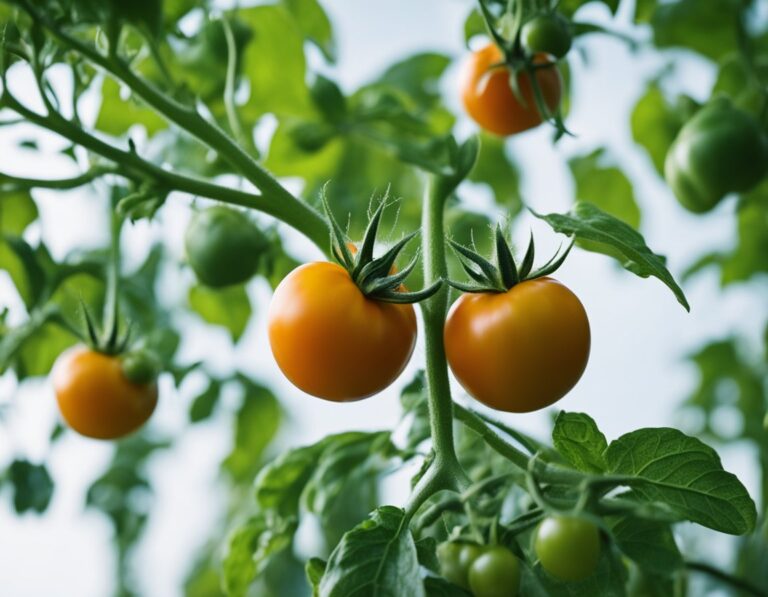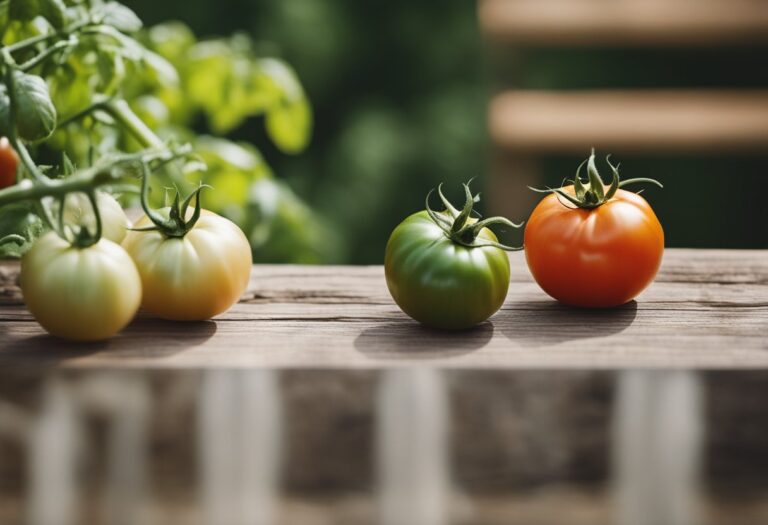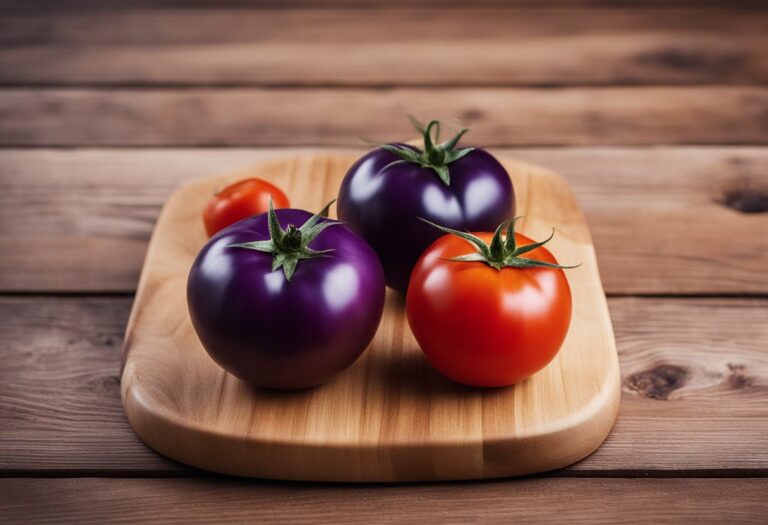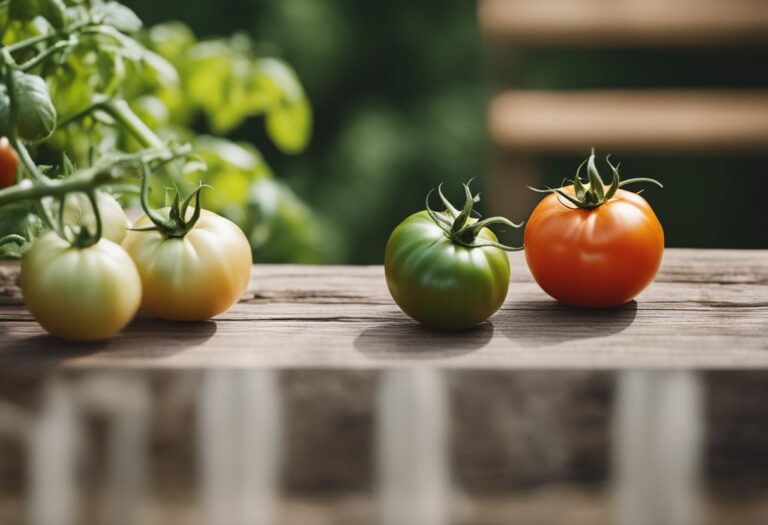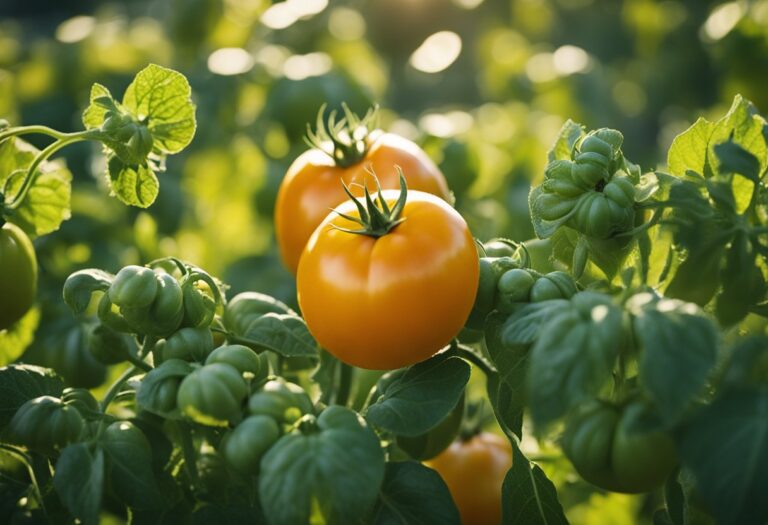Heirloom vs. Hybrid Tomatoes: Which is the Best Choice for Your Garden?
If you’re planning on growing tomatoes, you might be wondering which variety to choose. Two popular options are heirloom and hybrid tomatoes.
While both have their advantages and disadvantages, there are some key differences between the two that you should consider before making your choice.
Heirloom tomatoes are open-pollinated, meaning they are pollinated naturally by insects or wind. They have been around for at least 50 years and are often passed down from generation to generation. Heirloom tomatoes come in a wide variety of shapes, sizes, and colors, and are known for their unique flavors.
They are often grown for their taste rather than their appearance or ability to withstand shipping, making them a popular choice for home gardeners and farmers markets. However, because they are not bred for disease resistance or uniformity, they can be more susceptible to pests and diseases and may not produce as much fruit as hybrid varieties.
Hybrid tomatoes, on the other hand, are created by crossbreeding two different tomato plants to create a new variety with desirable traits. These traits can include disease resistance, uniformity, and higher yields. Hybrid tomatoes are often grown by commercial farmers because they are easier to grow and produce more fruit than heirloom varieties.
However, because they are not open-pollinated, you cannot save the seeds from a hybrid tomato and expect to get the same plant the following year. Additionally, some people feel that hybrid tomatoes lack the flavor of heirloom varieties.
Key Takeaways
- Heirloom tomatoes are open-pollinated and known for their unique flavors, but can be less disease-resistant and produce less fruit than hybrid varieties.
- Hybrid tomatoes are created by crossbreeding two different plants to create a new variety with desirable traits, such as disease resistance and higher yields.
- When choosing between heirloom and hybrid tomatoes, consider your priorities, such as taste, disease resistance, and yield, to determine which variety is right for you.
Heirloom vs. Hybrid Tomatoes
If you’re looking to grow tomatoes, you may have come across the terms “heirloom” and “hybrid.” While both types of tomatoes have their own unique characteristics, it’s important to understand the differences between them before deciding which one to grow in your garden.
Defining Heirloom Tomatoes
Heirloom tomatoes are open-pollinated varieties that have been passed down through generations.
These tomatoes are often considered to be more flavorful and come in a wide range of colors, shapes, and sizes. They are typically grown from seeds that have been saved from previous harvests.
Here are some key characteristics of heirloom tomatoes:
- They have been around for at least 50 years.
- They are open-pollinated, meaning they are pollinated naturally by insects or wind.
- They come in a wide range of colors, shapes, and sizes.
- They are often considered to be more flavorful than hybrid tomatoes.
Understanding Hybrid Tomatoes
Hybrid tomatoes, on the other hand, are created by cross-breeding two different tomato varieties.
The goal of hybridization is to create a tomato that has the best traits of both parent plants. Hybrid tomatoes are often bred for their disease resistance, yield, and uniformity.
Here are some key characteristics of hybrid tomatoes:
- They are created by cross-breeding two different tomato varieties.
- They are often bred for their disease resistance, yield, and uniformity.
- They may have a longer shelf life than heirloom tomatoes.
- They may be less flavorful than heirloom tomatoes.
Key Differences
Here are some key differences between heirloom and hybrid tomatoes:
| Characteristic | Heirloom Tomatoes | Hybrid Tomatoes |
| Age | At least 50 years old | Created in recent years |
| Pollination | Open-pollinated | Cross-bred |
| Flavor | Often considered more flavorful | May be less flavorful |
| Disease Resistance | May be more susceptible to disease | Often bred for disease resistance |
| Yield | May produce less predictably | Often bred for higher yields |
Ultimately, the choice between heirloom and hybrid tomatoes comes down to personal preference. If you’re looking for a tomato that has a unique flavor and appearance, heirloom tomatoes may be the way to go.
However, if you’re looking for a tomato that is disease-resistant and produces a high yield, hybrid tomatoes may be a better choice.
Advantages and Disadvantages
Pros and Cons of Heirloom Tomatoes
Heirloom tomatoes have been around for many years and have been passed down through generations.
They are known for their unique flavors and textures, which are often lost in hybrid varieties. However, there are also some disadvantages to growing heirloom tomatoes.
Pros of Heirloom Tomatoes
- Unique flavors and textures: Heirloom tomatoes come in a variety of shapes, sizes, and colors, each with its own distinct flavor and texture. Some are sweet, some are tangy, and some are savory.
- History and tradition: Heirloom tomatoes are often associated with history and tradition. They have been passed down through generations of gardeners and are often grown for their sentimental value.
- Open-pollinated: Heirloom tomatoes are open-pollinated, which means they are pollinated naturally by insects or the wind. This allows for natural genetic diversity and ensures that the seeds will produce the same type of tomato time after time.
Cons of Heirloom Tomatoes
- Disease susceptibility: Heirloom tomatoes are often more susceptible to disease than hybrid varieties. This is because they have not been bred for disease resistance.
- Low yields: Heirloom tomatoes often have lower yields than hybrid varieties. This is because they are often more finicky and only grow well in certain conditions.
- Inconsistent appearance: Heirloom tomatoes can vary greatly in appearance, even on the same plant. This can make them less desirable for commercial growers.
Pros and Cons of Hybrid Tomatoes
Hybrid tomatoes are a cross between two different tomato varieties. They are often bred for disease resistance, high yields, and uniform appearance. However, there are also some disadvantages to growing hybrid tomatoes.
Pros of Hybrid Tomatoes
- Disease resistance: Hybrid tomatoes are often bred for disease resistance, which can make them more resilient to common tomato diseases.
- High yields: Hybrid tomatoes are often bred for high yields, which can make them more productive than heirloom varieties.
- Uniform appearance: Hybrid tomatoes often have a uniform appearance, which can make them more desirable for commercial growers.
Cons of Hybrid Tomatoes
- Lack of flavor: Hybrid tomatoes are often bred for their disease resistance and high yields, which can come at the expense of flavor. They may not have the unique flavors and textures of heirloom varieties.
- Dependence on pesticides: Hybrid tomatoes may be more dependent on pesticides to control pests and diseases.
- Limited genetic diversity: Hybrid tomatoes are often bred from a limited number of parent plants, which can limit their genetic diversity and make them more susceptible to disease in the long run.
Choosing the Right Tomato for Your Garden
When it comes to choosing between heirloom and hybrid tomatoes, it can be a tough decision. Here are some factors to consider when selecting the perfect tomato for your garden:
Taste
If you’re a tomato lover who craves a sweet, juicy, and flavorful tomato, then heirloom tomatoes are the way to go. They come in a wide variety of shapes, sizes, and colors and are known for their intense, rich flavor.
On the other hand, hybrid tomatoes are bred for their disease resistance, yield, and uniformity. They may not have the same depth of flavor as heirloom tomatoes, but they can be a great option for those who want a reliable and consistent harvest.
Disease Resistance
If you live in an area where tomato diseases are prevalent, then hybrid tomatoes may be a better choice for you.
They are bred to be resistant to common diseases such as blight, verticillium wilt, and fusarium wilt. This means that you’re less likely to lose your entire crop to disease.
Heirloom tomatoes, on the other hand, are more susceptible to disease and may require more care and attention to keep them healthy.
Yield
If you’re looking for a tomato plant that will produce a high yield, then hybrid tomatoes are the way to go. They are bred to produce a large number of tomatoes per plant, which can be great if you’re looking to can or preserve your harvest.
Heirloom tomatoes, on the other hand, may produce fewer tomatoes per plant, but they are often larger and more flavorful.
Climate
Another factor to consider when choosing between heirloom and hybrid tomatoes is your climate. Heirloom tomatoes are often better suited for cooler climates, while hybrid tomatoes are better suited for warmer climates.
If you live in a cooler climate, consider planting heirloom tomatoes such as Brandywine, Cherokee Purple, or Green Zebra. If you live in a warmer climate, consider planting hybrid tomatoes such as Early Girl, Better Boy, or Celebrity.
Ultimately, the choice between heirloom and hybrid tomatoes comes down to personal preference. Consider your taste, climate, and growing conditions when making your decision.
Frequently Asked Questions
How do hybrid tomatoes differ from heirloom tomatoes?
Hybrid tomatoes are created by cross-pollinating two different tomato varieties to create a new variety with specific traits.
On the other hand, heirloom tomatoes are open-pollinated, meaning they are pollinated naturally by insects, wind, or other means. This results in a tomato variety that has been passed down over generations and has a unique flavor profile.
What are some popular hybrid tomato varieties?
Some popular hybrid tomato varieties include Big Boy, Better Boy, Early Girl, and Celebrity. These varieties are known for their disease resistance, high yield, and uniform fruit size.
Are heirloom tomatoes illegal and why?
No, heirloom tomatoes are not illegal. However, some states have restrictions on the sale of seeds or plants that are not certified disease-free.
This is because heirloom varieties may be more susceptible to diseases and pests than hybrid varieties.
What are the advantages of growing hybrid tomatoes?
Hybrid tomatoes offer several advantages over heirloom varieties. They are generally more disease-resistant, have higher yields, and are more uniform in size and shape.
This makes them easier to grow and harvest. Additionally, hybrid tomatoes are often bred for specific traits, such as flavor, color, or texture.
How big can hybrid tomatoes get?
Hybrid tomatoes can grow to be quite large, with some varieties reaching weights of over a pound. However, the size of the tomato will depend on the specific variety and growing conditions.
Which type of tomato is generally preferred: heirloom or hybrid?
This is a matter of personal preference. Heirloom tomatoes are known for their unique flavors and histories, while hybrid tomatoes are prized for their disease resistance and high yields.
Ultimately, the choice between heirloom and hybrid tomatoes will depend on your specific gardening goals and taste preferences.

